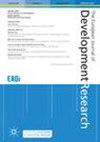基于arduino土壤水分传感器的草莓植物自动浇水系统原型设计
IF 2.6
3区 社会学
Q2 DEVELOPMENT STUDIES
引用次数: 0
摘要
使用基于arduino的湿度传感器作为微控制器的自动水管理为草莓种植提供了实用性,特别是在Blitar City等高温地区。本研究的目的是设计和测试一个基于arduino的草莓植物土壤水分传感器的自动浇水系统原型。在本研究中,采用的方法是根据设计设计一个基于arduino的草莓(fragaria ananassa)土壤水分传感器的原型自动浇水系统,使原型能够正常工作,并对草莓(fragaria ananassa)原型进行测试,每隔一定的时间获得水分数据和正确的浇水时间。研究活动分4个阶段进行,包括需求分析阶段、原型设计阶段、测试评估阶段和最终产品阶段。从产品设计开发的结果来看,发现土壤湿度传感器、arduino和水泵都是根据输入或命令工作的。本文章由计算机程序翻译,如有差异,请以英文原文为准。
Design of Automatic Watering System Prototype with Arduino-Based Soil Moisture Sensor for Strawberry Plants (Fragaria Ananassa)
Automatic water management using an Arduino-based humidity sensor as a microcontroller provides practicality in strawberry cultivation, especially in high temperature areas such as in Blitar City. The purpose of this research is to design and test a automatic watering system prototype with an arduino-based soil moisture sensor for strawberry plants (fragaria ananassa). In this study, the method used was designing a prototype automatic watering system with an arduino-based soil moisture sensor for strawberry plants (fragaria ananassa) according to the design so that the prototype could work properly and testing the prototype for strawberry plants (fragaria ananassa) to get moisture data and the right time for giving water every certain period of time. The research activities were carried out in 4 stages including the needs analysis stage, the prototype design stage, the test and evaluation stage, and the final product stage. From the results of product design and development, it was found that the soil moisture sensor, arduino and water pump work according to the input or command.
求助全文
通过发布文献求助,成功后即可免费获取论文全文。
去求助
来源期刊

European Journal of Development Research
DEVELOPMENT STUDIES-
CiteScore
5.70
自引率
4.00%
发文量
77
期刊介绍:
The European Journal of Development Research (EJDR) redefines and modernises what international development is, recognising the many schools of thought on what human development constitutes. It encourages debate between competing approaches to understanding global development and international social development. The journal is multidisciplinary and welcomes papers that are rooted in any mixture of fields including (but not limited to): development studies, international studies, social policy, sociology, politics, economics, anthropology, education, sustainability, business and management. EJDR explicitly links with development studies, being hosted by European Association of Development Institutes (EADI) and its various initiatives.
As a double-blind peer-reviewed academic journal, we particularly welcome submissions that improve our conceptual understanding of international development processes, or submissions that propose policy and developmental tools by analysing empirical evidence, whether qualitative, quantitative, mixed methods or anecdotal (data use in the journal ranges broadly from narratives and transcripts, through ethnographic and mixed data, to quantitative and survey data). The research methods used in the journal''s articles make explicit the importance of empirical data and the critical interpretation of findings. Authors can use a mixture of theory and data analysis to expand the possibilities for global development.
Submissions must be well-grounded in theory and must also indicate how their findings are relevant to development practitioners in the field and/or policy makers. The journal encourages papers which embody the highest quality standards, and which use an innovative approach. We urge authors who contemplate submitting their work to the EJDR to respond to research already published in this journal, as well as complementary journals and books. We take special efforts to include global voices, and notably voices from the global South. Queries about potential submissions to EJDR can be directed to the Editors.
EJDR understands development to be an ongoing process that affects all communities, societies, states and regions: We therefore do not have a geographical bias, but wherever possible prospective authors should seek to highlight how their study has relevance to researchers and practitioners studying development in different environments. Although many of the papers we publish examine the challenges for developing countries, we recognize that there are important lessons to be derived from the experiences of regions in the developed world.
The EJDR is print-published 6 times a year, in a mix of regular and special theme issues; accepted papers are published on an ongoing basis online. We accept submissions in English and French.
 求助内容:
求助内容: 应助结果提醒方式:
应助结果提醒方式:


